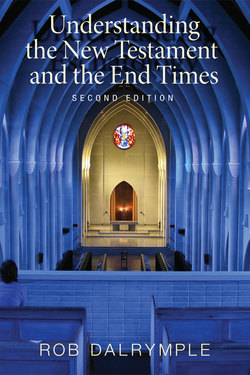Читать книгу Understanding the New Testament and the End Times, Second Edition - Rob Dalrymple - Страница 11
На сайте Литреса книга снята с продажи.
5 Understanding Prophecy and the End Times
ОглавлениеProphecy, in the biblical tradition, is not exclusively or even primarily about making pronouncements and predictions concerning the future. Rather, prophecy is speaking words of comfort and/or challenge, on behalf of God, to the people of God in their concrete historical situation.97
In my classes over the years when teaching this great book, I make a final plea in the opening lecture regarding the necessity of exegesis as the proper way—indeed the only way—that leads to understanding. . . . The unfortunate reality is that almost all of the popular stuff written on Revelation, which tends to be well known by many of these students, has scarcely a shred of exegetical basis to it. Such interpreters usually begin with a previously worked out eschatological scheme that they bring to the text, a scheme into which they tend to spend an extraordinary amount of energy trying to make everything in the text fit, and which they then attempt to defend, but with very little success.98
Introduction
The failure to understand prophecy, both the purpose of prophecy and the nature of prophetic language, is a significant factor in much of the contemporary misunderstandings related to the end times. A popular conception of the prophets is that they were primarily prognosticators of things to come. In particular, the OT prophets were seen as those who had divine insight into the coming of the Christ and the end of the world. A common popular assumption among many Christians is that one of the main objectives of prophecy relates to the “last generation”99—which is then assumed to be either our present generation or a near future one. From this point, the biblical interpreter then filters both contemporary events and the biblical text in such a way that reinforces these convictions. Furthermore, it is often asserted that the prophets used language in a “literal” fashion. Therefore, if a prophet says that “stars will fall from the sky,” then it is assumed that a literal event in which stars fall from the sky will take place. As we will see, the nature and purpose of prophecy was much more concerned with the prophets’ own present world. The prophets spoke to the people of their day in the language of their day.
Understanding the Nature and Purpose of Prophecy
To properly understand biblical prophecy we must first ask, what is the primary purpose of prophecy? To do this, we must also come to understand the language of the prophets. That is, how did they go about describing the things that they were prophesying? Did they use language in a woodenly literal manner or did they employ imagery? And, how might we know when they are using language literally or figuratively?
We must also inquire as to the nature of prophecy and its fulfillment. That is, when prophecy is fulfilled does it tend to take on a more literal, one-to-one correspondence, or does the fulfillment occur in a manner that transcends the initial expectations? For this we have the advantage of the NT. The NT consistently cites the OT in terms of promise-fulfillment. So, as we examine the fulfillment of prophecy in the NT, we may observe the manner in which the prophesies of the OT are fulfilled. Then, we must determine whether or not this provides a pattern for our understanding of prophecy as a whole and what to expect in the future.
Prophecy Had Meaning to Its Original Audience
We must understand several factors with regard to the purpose of prophecy in general. First, and foremost, is that fact that all prophecy—in fact, all Scripture—had meaning to its original audience. In fact, we can go so far as to assert that the prophets were centrally concerned with the people whom they were addressing.100
